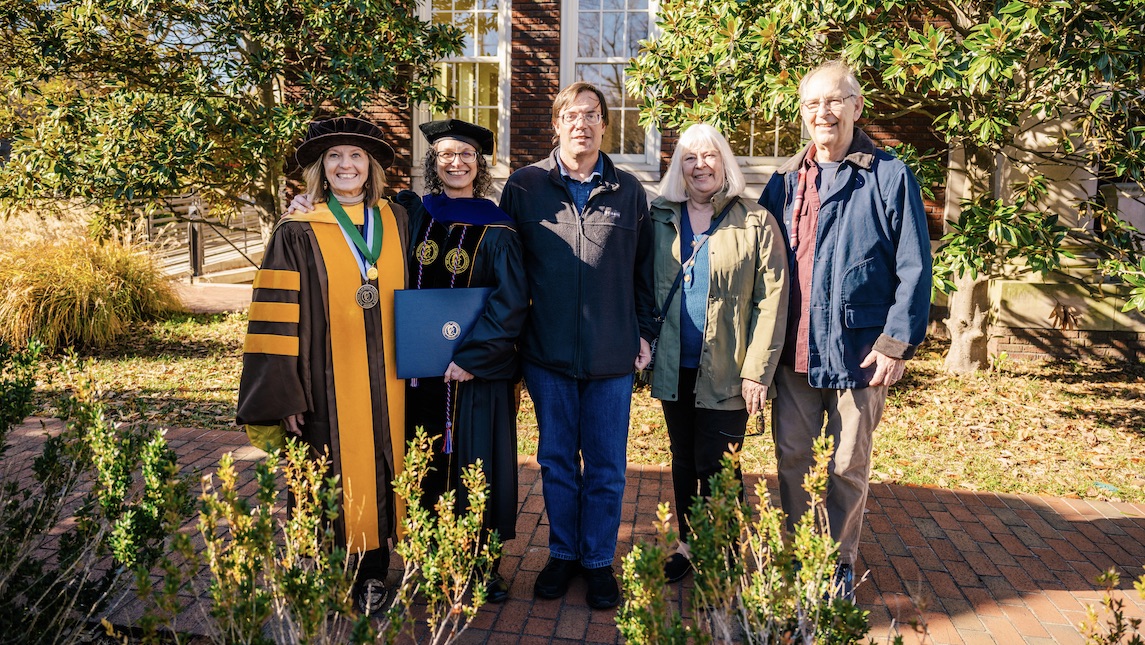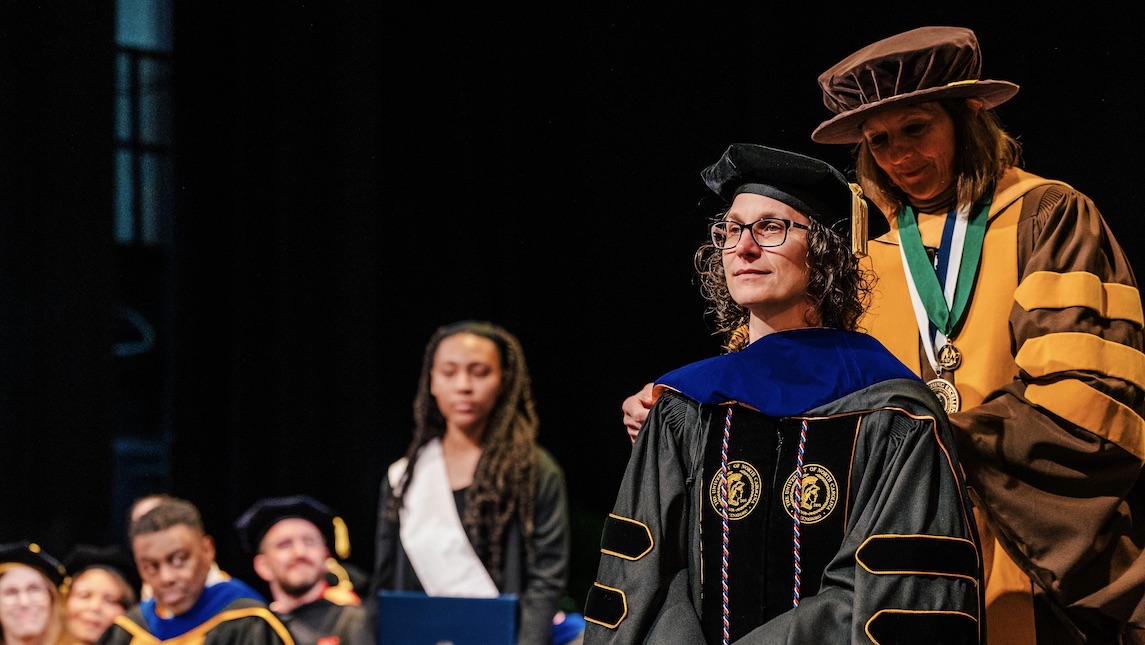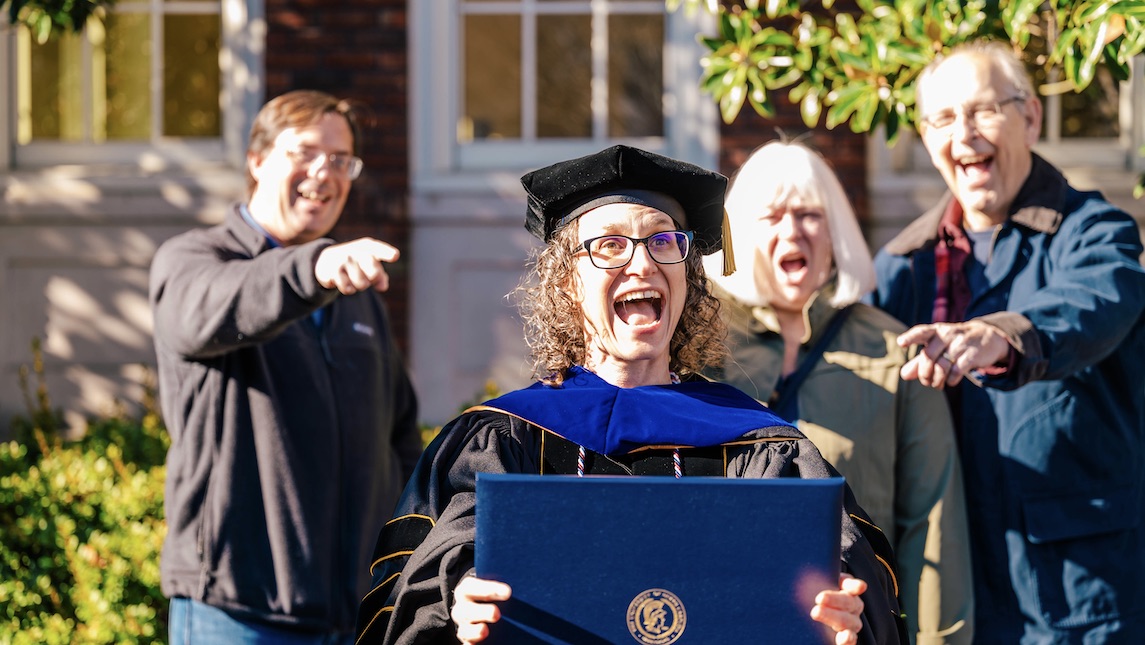Kimberly Vogt is not in the business of giving up.
From being in the ground war of Operation Iraqi Freedom and then working in military intelligence to becoming an RN via community college and then working toward a PhD degree, she perseveres in her pursuits.
Vogt says she came to the UNC Greensboro because it was a “university I could relate to.” She believed in UNCG’s mission, liked the population they served, and appreciated their inclusiveness.
And she stayed due to the support and integrity of the School of Nursing (SON)’s faculty, staff, and PhD program as well as the relationships she formed.
Nursing, A New Career
Vogt joined the military immediately following high school. She was in the reserve component for three years and then active duty for 10 years.
Vogt started as an MP (Military Police) and was reclassified as MI (Military Intelligence), which she calls her “dream job.” But with small children at home, she made the difficult decision to leave the military and quickly discovered how challenging the transition into civilian life can be.
While taking classes at Fayetteville Technical Community College, she saw a nursing brochure.
“I thought, ‘I love science, and I like serving people’,” says Vogt. “I think nursing is a good fit for me.”
And that was just the start. After becoming a Registered Nurse (RN), Vogt went on to complete her BSN, her MSN and now her Doctor of Philosophy in Nursing.


Intentional Lands at UNCG
One of Vogt’s professors strongly encouraged her to pursue a doctoral degree, and she intentionally landed at UNCG’s SON although it was a two-hour drive from her home.
At the time, she did not realize the work and commitment the program would require.
“I will admit that I quit this program on more than one occasion,” she says. “But Dr. Letvak would not give up on me. She dragged me, sometimes kicking and screaming, across the finish line.”
Susan Letvak is director of the SON’s PhD program and coordinator of the Veteran Access Program (VAP), where many nursing students who are veterans have found community.
“Kim was an exceptional student in every way – with a research focus that will significantly advance nursing science,” says Letvak. “Her dedication to research is evident.”
Vogt credits “having the right people in place” with helping her complete the program and walk across the stage in her hooding ceremony, specifically pointing to her cohort, Letvak, her dissertation committee members and her family.

Offering Affirmative Support
Vogt’s dissertation research on affirmative care grew out of the gender bias she experienced while in the military in the 90s.
“In my formative years, there was a lot of oppression due to my gender,” says Vogt. “It shaped my view of the world – how I saw people, how I saw myself, and how I saw my gender.”
While working as a nurse, she noticed the same type of oppression existed for transgender people, and this realization developed into the focus of her doctoral research.
Affirmative care involves affirming patients based on who they say they are and not labeling them based on assumptions about gender and sex. Nurses can start a conversation with transgender patients – asking how they want to be addressed and how they want to discuss body parts.
“Using someone’s chosen name and pronouns is not hard to do,” Vogt suggests. “Those are things we can control as nurses. It requires respecting how the individual wants the conversation to go.”
Vogt’s goal is to build an instrument to assess a nurse’s willingness to provide gender affirming care from a social aspect.
She felt supported and affirmed in her line of research: “I do not think I would have felt that way at a different institution. They were open and forward thinking, especially my committee.”
Training, Teaching, Serving
Vogt has also been active with an HRSA Advanced Nursing Education – Sexual Assault Nurse Examiners (ANE-SANE) grant with PI Sherry Leviner. It was a natural fit for Vogt to be Co-PI due to her grant work experience and background as an Emergency Department (ED) nurse.
SANE is a needed skill in ED nurses, but Vogt says a training deficiency exists. She and Leviner have trained many participants via the grant but realized some cannot complete the three acute cases required for training completion, most often due to their location. Therefore, the research duo hopes to pair the training with a preceptorship, within which participants can work on the necessary cases.
“Our overall goal is to grow this training program and sustain nurses to do this important work,” says Vogt.
Vogt also joined Fayetteville State University as faculty this past semester, teaching two clinical groups, and will continue teaching in spring. And she’s maintained her clinical work as an ED nurse as well.
A Shift in Thinking
Vogt cannot express enough how her doctoral program has shifted her way of thinking.
“When I am looking at information, I no longer see just what is in front of me. I am seeing what is around me, what’s above me, and even what could be,” she says.
“The program changed my perspective on how I view and understand things. I credit that to the faculty, the program, and the way the program is designed.”
Story by Amy Burtch, AMBCopy LLC
Photography by Sean Norona, University Communications







